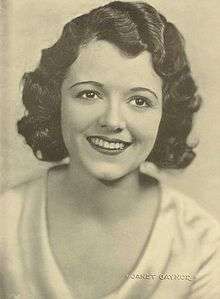Sunny Side Up (film)
| Sunny Side Up | |
|---|---|
 | |
| Directed by | David Butler |
| Produced by | William Fox |
| Written by |
B. G. DeSylva Lew Brown Ray Henderson |
| Starring |
Janet Gaynor Charles Farrell |
| Music by |
B. G. DeSylva Lew Brown Ray Henderson |
| Cinematography |
Ernest Palmer John Schmitz |
| Edited by | Irene Morra |
| Distributed by | Fox Film Corporation |
Release dates |
|
Running time | 121 minutes |
| Country | United States |
| Language | English |
| Box office | $3.3 million[1][2] |
Sunny Side Up is a 1929 American Pre-Code Fox Movietone musical film starring Janet Gaynor and Charles Farrell, with original songs, story, and dialogue by B. G. DeSylva, Lew Brown and Ray Henderson. The romantic comedy/musical premiered on October 3, 1929 at the Gaiety Theatre in New York City.[3] The film was directed by David Butler, had (now-lost) Multicolor sequences, and a running time of 121 minutes.
Plot
The film centres around a Will-they won't-they romance. Wealthy Jack Cromwell from Long Island runs off to New York City on account of his fiancee's relentless flirting. He attends an Independence Day block party where Molly Carr, from Yorkville, Manhattan, falls in love with him. Comic relief is provided by grocer Eric Swenson (El Brendel), above whose shop Molly and her flatmate, Bea Nichols (Marjorie White), live.[3][4] Gaynor performs a charming singing and dancing version of the song "(Keep Your) Sunny Side Up" for a crowd of her neighbors, complete with top hat and cane. Later in the film, a lavish pre-Code dance sequence for the song "Turn on the Heat," including scantily clad and gyrating island women enticing bananas on trees to abruptly grow and stiffen, with the graphic metaphor lost on no one, occurs without Gaynor's participation.
Gaynor and Farrell made almost a dozen films together, including Frank Borzage's classics Seventh Heaven (1927), Street Angel (1928), and Lucky Star (1929). Gaynor won the first Academy Award for Best Actress for the first two and F. W. Murnau's Sunrise.
Cast
- Janet Gaynor as Molly Carr
- Charles Farrell as Jack Cromwell
- Marjorie White as Bea Nichols
- El Brendel as Eric Swenson
- Mary Forbes as Mrs. Cromwell
- Peter Gawthorne as Lake
- Sharon Lynn as Jane Worth
Reception
The Times and The New York Times both express the opinion that the film, and the singing voices of Gaynor and Farrell, are all tolerable if not exactly worthy of praise. Despite the sugary sentimentality, the film is engaging, while the cinematography and special effects are impressive.[3][4]
Footage from Sunny Side Up was included in the comedy film It Came from Hollywood, which parodied B movies.[5]
The film is recognized by American Film Institute in these lists:
- 2006: AFI's Greatest Movie Musicals – Nominated[6]
Music
I'm A Dreamer, Aren't We All?
Several times throughout the film Gaynor sings the tune "I'm a Dreamer, Aren't We All?" and, on one occasion, sings it impressively, according to the New York Times.[3] The credits are: words, De Sylva & Brown; music, Ray Henderson.
The song was punned by the Marx Brothers in the film Animal Crackers (1930). Groucho asks his brother to "play the song about Montreal". Chico asks, "Montreal?, and Groucho replies, "I'm a dreamer, Montreal." The pun has been much-recycled [7] not least in Stewart Parker's award-winning play I’m a Dreamer, Montreal.
The tune was recorded by John Coltrane in 1958 [8] and included on his album Bahia (1964).
Turn on the Heat
Another song in the film. This one would be used in the Pooch the Pup cartoon Hot and Cold (1933).[9]
(Keep Your) Sunny Side Up
Another song in the film that would later be used as the theme song to the 1988 British sitcom Clarence.
See also
References
- ↑ Quigley Publishing Company "The All Time Best Sellers", International Motion Picture Almanac 1937-38 (1938) p 942 accessed April 19, 2014
- ↑ "WHICH CINEMA FILMS HAVE EARNED THE MOST MONEY SINCE 1914?". The Argus (Melbourne, Vic.: 1848-1956). Melbourne, Vic.: National Library of Australia. March 4, 1944. p. 3 Supplement: The Argus Weekend magazine. Retrieved August 6, 2012.
- 1 2 3 4 NY Times October 4, 1929 Movie Review
- 1 2 The Times, December 30, 1929, New Gallery Cinema "Sunny Side Up"
- ↑ "Collage of 10 worst films now a movie of its own", Lodi News-Sentinel, November 25, 1982. (p.8).
- ↑ "AFI's Greatest Movie Musicals Nominees" (PDF). Retrieved 2016-08-13.
- ↑ Glenn Mitchell, The Marx Brothers encyclopedia (Reynolds & Hearn, 2003) ISBN 1-903111-49-8
- ↑ The Complete Prestige Recordings
- ↑ "The Walter Lantz Cartune Encyclopedia: 1933". The Walter Lantz Cartune Encyclopedia. Retrieved 2011-10-31.
